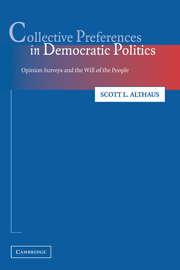Appendix A - Political Knowledge Indices
Published online by Cambridge University Press: 06 January 2010
Summary
The information measures used in this book are based on those constructed and tested by Delli Carpini and Keeter (1993, 1996). These indices are primarily additive measures of correct answers to factual knowledge questions, where a correct answer is assigned a value of 1 and an incorrect response or no answer is given a value of 0. They also incorporate a subjective assessment of respondent knowledge level made by the survey interviewer at the conclusion of the interview. Three kinds of factual knowledge items were used to construct these indices: relative location tests in which correct answers are constructed by comparing responses to two different questions, open-ended questions asking respondents to identify the job or political office held by a public figure, and closed-ended questions testing knowledge of changes in the federal budget deficit, constitutional powers of federal branches, which party held majority status in both houses of Congress, and which party was more conservative than the other. An example of a correct answer to a relative location test is placing the Republican Party as relatively more conservative than the Democratic Party on a seven-point ideology scale, regardless of where on the ideology scale a respondent actually placed the two parties.
POLITICAL KNOWLEDGE INDICES USED IN CHAPTERS 1–5
The 1988 knowledge index has a mean of 11.0, standard deviation of 5.2, maximum value of 21, and minimum value of 0 (Cronbach's alpha = .88).
- Type
- Chapter
- Information
- Collective Preferences in Democratic PoliticsOpinion Surveys and the Will of the People, pp. 314 - 318Publisher: Cambridge University PressPrint publication year: 2003



